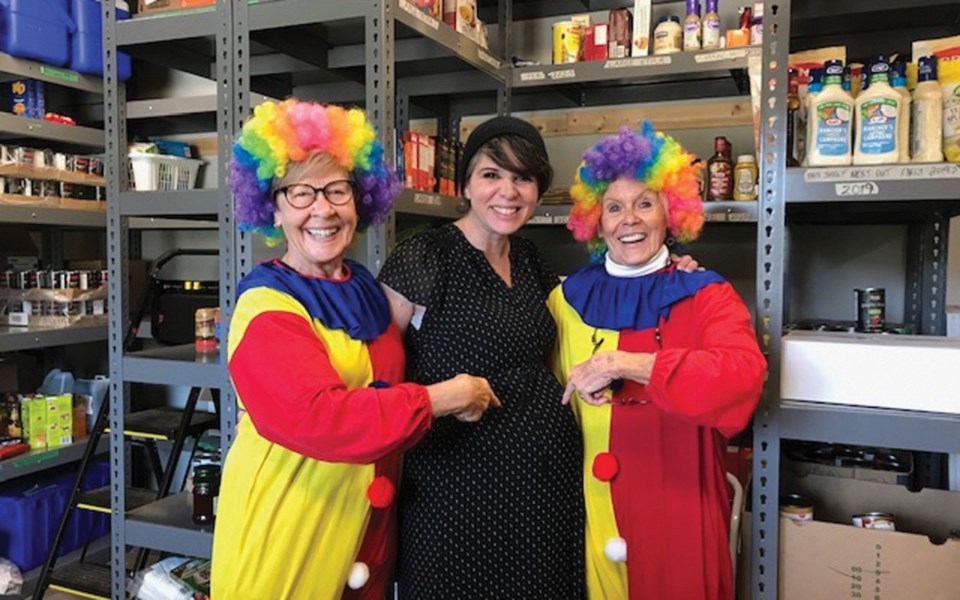For many Whistler newcomers, their initial reaction upon hearing that this bustling, expensive resort town has a food bank is one of surprise.
Well, that reaction, in turn, always surprises longtime Whistler Food Bank volunteer Elly Johnston.
"They'll say, 'A food bank? Whistler needs a food bank'? And then the next comment is, 'Well, why don't these people leave?,'" she said. "That, to me, is so, so shocking because why should they? What gives anybody else the right to live in a place any more than another person? "Sometimes it's because they've had either injuries or car accidents and they're not able to go to work. Or sometimes there are mental issues. Why shouldn't they get help? That's always been my answer—why should we not help anyone who needs help?"
Johnston has been providing that help since she first started volunteering at the food bank in 1997, just two years after she and her husband relocated to the resort. Since then, she's been spending two days a month, from 9 a.m. until noon., sorting through food deliveries, stocking fridges, checking expiry dates, and helping clients shop from the food bank's supply.
As Johnston recalled, she was volunteering as a Mountain Host when she was introduced to the food bank by fellow host Gail Fasken. "She's another one who's been there even longer than I have, was volunteering at the food bank and suggested to me I might be interested in helping out ... I have been there ever since."
Johnston, who also volunteers with the Friends of the Whistler Public Library program in addition to her 15-year stint as a Mountain Host, has stuck with the food bank from its beginnings in a tiny trailer near the Catholic Church of Whistler, through to its Spring Creek facility and, now, to its current Nesters location (though the food bank is temporarily operating out of the Whistler Conference Centre during the COVID-19 pandemic). While the food bank may have changed its address over the decades, the need for its services—and its volunteers—has not.
Johnston recalled seeing morning lineups outside the trailer on days the food bank was open.
Even while Whistler has boomed, "there always is that need, and that is a part that is, I always find, kind of sad. I think it's also a part of the reason that keeps me coming back, because even though a lot of us are doing fine and doing well, there are still always those people that are struggling. It makes you sad and makes you want to help out."
Another constant is the group of volunteers Johnston works with each shift. "We do get new people come and go, but there is a core group that has stayed," she explained. "It's amazing because we all know what each other has to do—so when we get there in the morning, we don't really need to be told what needs to be done, we pretty much know what needs to be done, and how. So, it works, and it's a wonderful giving feeling that you get from doing this."
Over the years, those fellow volunteers have also become Johnston's "best friends," she said, often joining each other for vacations or cycling trips.
Though Johnston has undoubtedly served thousands of locals over the years, there are a few in particular that stick out in her mind. She remembers one individual who was struggling with post-traumatic stress disorder.
"Through the help of the community—not just the food bank, but through Whistler Community Services [Society] and all the outreach people and everything, he got his life back together," she said. "I remember him standing in the room and we were all in tears. It's just so, so amazing." Johnston continued: "There are times when people have come in and they have been so incredibly grateful that it brings tears to your eyes because you just know that you've helped them through a really rough patch in their lives. Nobody wants to be there; that's the bottom line. And so, if you can bring a little bit of joy to somebody, it's pretty amazing and that does happen on a fairly frequent basis."
To that end, a volunteer shift at the food bank doesn't just entail doling out canned goods, Johnston explained. "The big thing that one has to do is to be non-judgmental and to be empathetic, and to listen—I think that's a huge one. If people want to talk to you, take the time to listen.
"Everyone has a story to tell and everyone's story is worth listening to."
National Volunteer Week takes place in Canada from April 19 to 25 this year.




